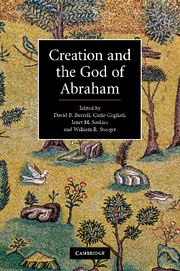Book contents
- Frontmatter
- Contents
- Contributors
- Preface
- Introduction
- 1 Creation ex nihilo: early history
- 2 Creatio ex nihilo: its Jewish and Christian foundations
- 3 The act of creation with its theological consequences
- 4 Scotistic metaphysics and creation ex nihilo
- 5 Creation and the context of theology and science in Maimonides and Crescas
- 6 Creation: Avicenna's metaphysical account
- 7 Four conceptions of creatio ex nihilo and the compatibility questions
- 8 Will, necessity and creation as monistic theophany in the Islamic philosophical tradition
- 9 Trinity, motion and creation ex nihilo
- 10 The Big Bang, quantum cosmology and creatio ex nihilo
- 11 What is written into creation?
- 12 Creatio ex nihilo and dual causality
- 13 God and creatures acting: the idea of double agency
- 14 Thomas Aquinas on knowing and coming to know: the beatific vision and learning from contingency
- Index
- References
4 - Scotistic metaphysics and creation ex nihilo
Published online by Cambridge University Press: 07 September 2010
- Frontmatter
- Contents
- Contributors
- Preface
- Introduction
- 1 Creation ex nihilo: early history
- 2 Creatio ex nihilo: its Jewish and Christian foundations
- 3 The act of creation with its theological consequences
- 4 Scotistic metaphysics and creation ex nihilo
- 5 Creation and the context of theology and science in Maimonides and Crescas
- 6 Creation: Avicenna's metaphysical account
- 7 Four conceptions of creatio ex nihilo and the compatibility questions
- 8 Will, necessity and creation as monistic theophany in the Islamic philosophical tradition
- 9 Trinity, motion and creation ex nihilo
- 10 The Big Bang, quantum cosmology and creatio ex nihilo
- 11 What is written into creation?
- 12 Creatio ex nihilo and dual causality
- 13 God and creatures acting: the idea of double agency
- 14 Thomas Aquinas on knowing and coming to know: the beatific vision and learning from contingency
- Index
- References
Summary
INTRODUCTION
In the High Middle Ages all the major theologians of the Christian West teach that God created our world ex nihilo, that is, that first there is God and no world, and then, by an act of divine will, there is a world which is, in some sense, at a distance from and therefore other than God. During the Age of Enlightenment the concept of the creation of the world modulates to a distant key, for we find philosophers propounding the thesis that the world is the product of an act not of the divine but of the human mind. It may seem bizarre to hold that each of us produces the world in which we live, and presumably therefore produces it on the side, without our even noticing that we are engaged in such a stupendous act. Nevertheless there are powerful arguments in support of the claim; I shall give prominence to doctrines of David Hume and Immanuel Kant, doctrines according to which certain features of the world, features which give rise to our perception of the world as objectively valid, are the product of our own mental powers.
A question therefore arises as to the relation between on the one hand the religious claim that God created the world and on the other hand the Enlightenment claim that we human beings are world-makers. The two claims may seem mutually incompatible.
- Type
- Chapter
- Information
- Creation and the God of Abraham , pp. 53 - 64Publisher: Cambridge University PressPrint publication year: 2010
References
- 2
- Cited by

